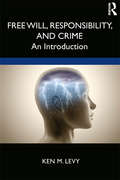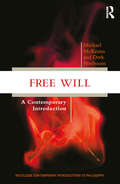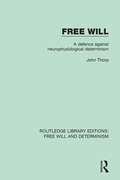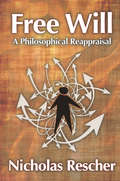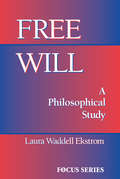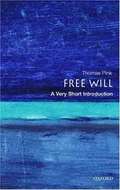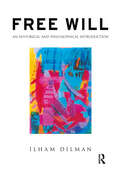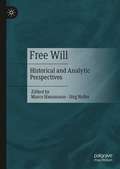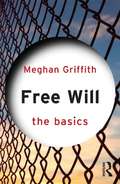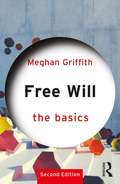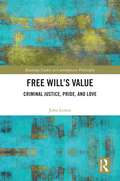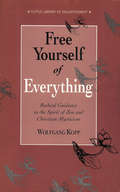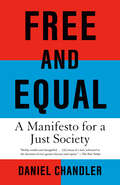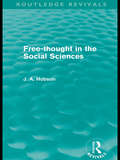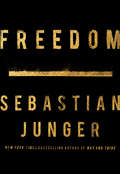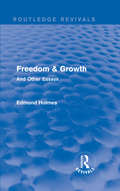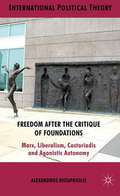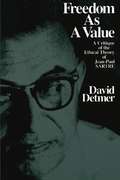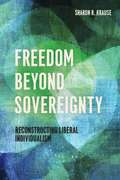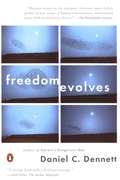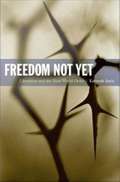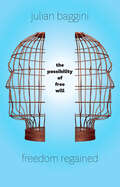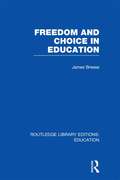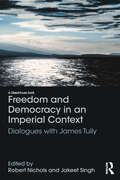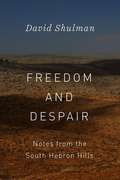- Table View
- List View
Free Will, Responsibility, and Crime: An Introduction
by Ken M. LevyIn his book, philosopher and law professor Ken Levy explains why he agrees with most people, but not with most other philosophers, about free will and responsibility. Most people believe that we have both – that is, that our choices, decisions, and actions are neither determined nor undetermined but rather fully self-determined. By contrast, most philosophers understand just how difficult it is to defend this "metaphysical libertarian" position. So they tend to opt for two other theories: "responsibility skepticism" (which denies the very possibility of free will and responsibility) and "compatibilism" (which reduces free will and responsibility to properties that are compatible with determinism). In opposition to both of these theories, Levy explains how free will and responsibility are indeed metaphysically possible. But he also cautions against the dogma that metaphysical libertarianism is actually true, a widespread belief that continues to cause serious social, political, and legal harms. Levy’s book presents a crisp, tight, historically informed discussion, with fresh clarity, insight, and originality. It will become one of the definitive resources for students, academics, and general readers in this critical intersection among metaphysics, ethics, and criminal law. Key features: Presents a unique, qualified defense of "metaphysical libertarianism," the idea that our choices, decisions, and actions can be fully self-determined. Written clearly, accessibly, and with minimal jargon – rare for a book on the very difficult issues of free will and responsibility. Seamlessly connects philosophical, legal, psychological, and political issues. Will be provocative and insightful for professional philosophers, students, and non-philosophers.
Free Will: A Contemporary Introduction (Routledge Contemporary Introductions to Philosophy #5)
by Michael Mckenna Derk PereboomAs an advanced introduction to the challenging topic of free will, this book is designed for upper-level undergraduates interested in a comprehensive first-stop into the field's issues and debates. It is written by two of the leading participants in those debates--a compatibilist on the issue of free will and determinism (Michael McKenna) and an incompatibilist (Derk Pereboom). These two authors achieve an admirable objectivity and clarity while still illuminating the field's complexity and key advances. Each chapter is structured to work as one week's primary reading in a course on free will, while more advanced courses can dip into the annotated further readings, suggested at the end of each chapter. A comprehensive bibliography as well as detailed subject and author indexes are included at the back of the book.
Free Will: A Defence Against Neurophysiological Determinism (Routledge Library Editions: Free Will and Determinism #4)
by John ThorpThe problem of freedom and determinism is one of the most enduring, and one of the best, problems in philosophy. One of the best because it so tenaciously resists solution while yet always seeming urgent, and one of the most enduring because it has always been able to present itself in different ways to suit the preoccupations of different ages. This book, first published in 1980, sets out to defend free will: it elaborates a sober and systematic case for libertarianism in the face of the overwhelming threat that is posed by the scientific study of the brain.
Free Will: A Philosophical Reappraisal
by Nicholas RescherThis volume is a reassessment of free will and, as such, seeks to answer the question: Do humans ever act under the guidance of the will? To determine if humans have free will, Rescher first examines what exactly free will is and how it should function. While the literature on the subject of free will is vast, a good deal still remains to be done to avert obscurity and confusion. Rescher leads the reader through a conceptual web of distinctions that, taken together, provide a satisfying contribution to philosophical thought on free will in general.Rescher sharpens his highly conceptual assessment by making distinctions--between productive (or metaphysical) and moral (or motivational) freedom, free decision and free action, motivational and causal determination of choices, durational events and the instantaneous eventuations that mark their commencements and completions, and between pre-determination and precedence determination. In doing so, he also examines the role of nature, nurture, and free choice. Each of these distinctions defines the characteristics of free will and averts a group of problems and difficulties traditionally ascribed to the doctrine. With these in place, it becomes possible to validate the compatibility between freedom of the will and a certain special mode of determinism.Rescher's conceptual perspective in this age-old debate opens up the prospect of naturalizing free volition through its natural emergence via the same process of evoking development that has seen the emergence of intelligence on the world's stage. That is, only after the conceptual issues are settled, can the question of how things actually stand be answered. This work will be an important reassessment of free will not just because of the author's final conclusion, but because of the issue-illuminating path he takes to get there.
Free Will: A Philosophical Study (Focus Ser.)
by Laura EkstromIn this comprehensive new study of human free agency, Laura Waddell Ekstrom critically surveys contemporary philosophical literature and provides a novel account of the conditions for free action. Ekstrom argues that incompatibilism concerning free will and causal determinism is true and thus the right account of the nature of free action must be indeterminist in nature. She examines a variety of libertarian approaches, ultimately defending an account relying on indeterministic causation among events and appealing to agent causation only in a reducible sense. Written in an engaging style and incorporating recent scholarship, this study is critical reading for scholars and students interested in the topics of motivation, causation, responsibility, and freedom. In broadly covering the important positions of others along with its exposition of the author's own view, Free Will provides both a significant scholarly contribution and a valuable text for courses in metaphysics and action theory.
Free Will: A Very Short Introduction
by Thomas PinkEvery day we seem to make and act upon all kinds of free choices - some of them trivial, and some so consequential that they change the course of one's life, or even the course of history. But are these choices really free? Or are we compelled to act the way we do by factors beyond our control? Is the feeling that we could have made different decisions just an illusion? And if our choices are not free, is it legitimate to hold people morally responsible for their actions?
Free Will: An Historical and Philosophical Introduction
by Ilham DilmanWhat is the place of human free will in our lives if all our actions are the result of some other cause? Does our processing unconscious beliefs or desires make us less free? Is our free will necessarily restricted if we do not choose our own beliefs? The debate between free will and its opposing doctrine, determinism, is one of the key issues in philosophy. Free Will: An historical and philosophical introduction provides a comprehensive introduction to this highly important question and examines the contributions made by sixteen of the most outstanding thinkers from the time of early Greece to the twentieth century:*Homer *Sophocles *Platto *Aristotle *St Augustine *St Thomas Aquinas *Descaartes *Spinoza *Hume *Kant *Schopehauer *Freud *Sartre *Weil *Wittgenstein *Moore Ilham Dilman brings together all the dimensions of the problem of free will with examples from literature, ethics and psychoanalysis. Drawing out valuable insights from both sides of the free will-determinism divide, and he provides an accessible and highly readable introduction to this perennial problem.
Free Will: Historical and Analytic Perspectives
by Jörg Noller Marco HausmannThis novel contributed volume advances the current debate on free will by bridging the divide between analytic and historically oriented approaches to the problem. With thirteen chapters by leading academics in the field, the volume is divided into three parts: free will and determinism, free will and indeterminism, and free will and moral responsibility. The contributors aim to initiate a philosophical discourse that profits from a combination of the two approaches. On the one hand, the analytic tools familiar from the debate – arguments, concepts, and distinctions – can be used to sharpen our understanding of classical philosophical positions. On the other hand, the rich philosophical tradition can be reconstructed so as to inspire new solutions. In recent years, the problem of free will has received special attention in the analytic arena. This is the first anthology to combine historical and analytic perspectives, significantly furthering the debate, and providing a crucial resource to academics and advanced students alike.
Free Will: The Basics (The Basics)
by Meghan GriffithThe question of whether humans are free to make their own decisions has long been debated and it continues to be a controversial topic today. In Free Will: The Basics readers are provided with a clear and accessible introduction to this central but challenging philosophical problem. The questions which are discussed include: Does free will exist? Or is it illusory? Can we be free even if everything is determined by a chain of causes? If our actions are not determined, does this mean they are just random or a matter of luck? In order to have the kind of freedom required for moral responsibility, must we have alternatives? What can recent developments in science tell us about the existence of free will? Because these questions are discussed without prejudicing one view over others and all technical terminology is clearly explained, this book is an ideal introduction to free will for the uninitiated.
Free Will: The Basics (The Basics)
by Meghan GriffithThe issue of whether humans are free to make their own decisions has long been debated, and it continues to be controversial today. In Free Will: The Basics Meghan Griffith provides a clear and accessible introduction to this important but challenging philosophical problem. She addresses the questions central to the topic including: Does free will exist, or is it illusory? Can we be free even if everything is determined by a chain of causes? If our actions are not determined, does this mean they are just random or a matter of luck? In order to have the kind of freedom required for moral responsibility, must we have alternatives? What can recent developments in science tell us about the existence of free will? These questions are discussed without prejudicing one view over others, and all technical terminology is clearly explained. This second edition has been revised and updated throughout, with the addition of new sections on dispositionalism, free will as self-organization, and situationism in psychology. Up-to-date suggestions for further reading and a glossary are also included, making Free Will: The Basics an ideal introduction for anyone coming to the subject for the first time.
Free Will’s Value: Criminal Justice, Pride, and Love (Routledge Studies in Contemporary Philosophy)
by John LemosThis book defends an event-causal theory of libertarian free will and argues that the belief in such free will plays an important, if not essential, role in supporting certain important values. In the first part of the book, the author argues that possession of libertarian free will is necessary for deserved praise and blame and reward and punishment. He contends that his version of libertarian free will – the indeterministic weightings view – is coherent and can fit with a scientific, naturalistic understanding of human nature. However, the author also notes that we don’t have sufficient evidentiary grounds to believe that human beings have this kind of free will. Despite this, he argues there are sufficiently strong value-based/axiological reasons to believe we have such free will and to live and act as if we have it. In the second part of the book, the author makes the case that the belief in such libertarian, desert-grounding free will is very important to defending human dignity in the context of criminal justice, making sense of justified pride and its value, and adding value to our relationships. Free Will’s Value will be of interest to scholars and advanced students working in metaphysics, philosophy of mind, action theory, ethics, and the philosophy of law.
Free Yourself of Everything
by Wolfgang Kopp Barbara Wittenberg-HaenauerIntended for those who earnestly seek spiritual guidance, this book conveys, with clear structure and precise language, the deepest wisdom of eastern and western mysticism. Drawing from his vast experience as a practicing meditation master, and using examples from great masters of Zen and Christian mysticism, Wolfgang Kopp presents the fundamental elements necessary for a successful journey to inner freedom.
Free and Equal: A Manifesto for a Just Society
by Daniel ChandlerImagine: You are designing a society, but you don't know who you'll be within it—rich or poor, man or woman, gay or straight. What would you want that society to look like? This is the revolutionary thought experiment proposed by the twentieth century's greatest political philosopher, John Rawls. As economist and philosopher Daniel Chandler argues in this hugely ambitious and exhilarating manifesto, it is by rediscovering Rawls that we can find a way out of the escalating crises that are devastating our world today."A vigorous case for adopting the liberal political framework laid out by John Rawls. . . . Chandler is a lucid and elegant writer, and there&’s an earnest sense of excitement propelling his argument — a belief that Rawls&’s framework for thinking through political issues offers a humane way out of the most intractable disputes.&”—The New York Times Book Review"Intellectually rigorous and full of hope.&”—Zadie Smith, bestselling author of White Teeth and The Fraud • &“A beautifully written and compelling argument that Rawlsian political philosophy can heal our broken societies.&”—Sir Angus Deaton, winner of the Nobel Prize in EconomicsTaking Rawls's humane and egalitarian liberalism as his starting point, Chandler builds a powerful case for a new progressive agenda that would fundamentally reshape our societies for the better. He shows how we can protect free speech and transcend the culture wars; get money out of politics; and create an economy where everyone has the chance to fulfil their potential, where prosperity is widely shared, and which operates within the limits of our finite planet.This is a book brimming with hope and possibility—a galvanizing alternative to the cynicism that pervades our politics. Free and Equal has the potential to offer a touchstone for a modern, egalitarian liberalism for many years to come, cementing Rawls's place in political discourse, and firmly establishing Chandler as a vital new voice for our time.
Free-Thought in the Social Sciences (Routledge Revivals)
by J. A. HobsonThis Routledge Revival sees the reissue of a seminal work by British economist, sociologist and academic John A. Hobson, elucidating his views on a variety of topics across the social sciences. He makes particular reference to the struggle between the disinterested urge of the social scientist and the interests and other motive forces which tend to influence and mould his processes of inquiry. The work is split into three parts, focussing upon free-thinking, economics and political ethics respectively.
Freedom
by Sebastian JungerA profound rumination on the concept of freedom from the New York Times–bestselling author of Tribe Throughout history, humans have been driven by the quest for two cherished ideals: community and freedom. The two don’t coexist easily; we value individuality and self-reliance yet are utterly dependent on community for our most basic needs. In this intricately crafted and thought-provoking book, Sebastian Junger examines the tension that lies at the heart of what it means to be human. For much of a year, Junger and three friends—a conflict photographer and two Afghan war vets—walk the railroad lines of the east coast of the United States. It is an experiment in personal autonomy, but also in interdependence. Dodging railroad cops, sleeping under bridges, cooking over fires and drinking from creeks and rivers, the four men forge a unique reliance on one another. In Freedom, Junger weaves his account of this journey with other topics: primatology and boxing strategy, the history of labour strikes and Apache renegades, the role of women in resistance movements, and the brutal reality of life on the Pennsylvania frontier. Written in exquisite, razor-sharp prose, the result is a powerful examination of the primary desire that defines us.
Freedom & Growth: And Other Essays (Essay Index Reprint Ser.)
by Edmond HolmesFirst published in 1923, this book collects together sixteen essays written between 1912 and 1922 that reflect how the author's views on education became increasingly interwoven with their views on "things in general" — with half dealing with each subject. Reflecting this interweave, they are arranged chronologically rather than by subject due to their "unity of conviction and purpose". The author argues that the question "Is man free to direct the process of his own growth?" naturally follows from the question "Is man a free agent?" Thus if freedom is inextricably linked to growth it becomes of paramount interest to the teacher and is explored here under a broad range of topics.
Freedom After the Critique of Foundations: Marx, Liberalism, Castoriadis and Agonistic Autonomy (International Political Theory)
by Alexandros KioupkiolisAn exploration of the contemporary re-conception of freedom after the critique of objective truths and ideas of an unchanging human nature, in which modern self-determination was grounded. This book focuses on the radical theorist Cornelius Castoriadis and the new paradigm of 'agonistic autonomy' is contrasted with Marxian and liberal approaches.
Freedom As a Value
by David DetmerThis dramatic re-evaluation of Sartre's ethical theory establishes its author as a leading American exponent of phenomenology and wins many new followers for Sartre in the English-speaking world.
Freedom Beyond Sovereignty: Reconstructing Liberal Individualism
by Sharon R. KrauseWhat does it mean to be free? We invoke the word frequently, yet the freedom of countless Americans is compromised by social inequalities that systematically undercut what they are able to do and to become. If we are to remedy these failures of freedom, we must move beyond the common assumption, prevalent in political theory and American public life, that individual agency is best conceived as a kind of personal sovereignty, or as self-determination or control over one’s actions. In Freedom Beyond Sovereignty, Sharon R. Krause shows that individual agency is best conceived as a non-sovereign experience because our ability to act and affect the world depends on how other people interpret and respond to what we do. The intersubjective character of agency makes it vulnerable to the effects of social inequality, but it is never in a strict sense socially determined. The agency of the oppressed sometimes surprises us with its vitality. Only by understanding the deep dynamics of agency as simultaneously non-sovereign and robust can we remediate the failed freedom of those on the losing end of persistent inequalities and grasp the scope of our own responsibility for social change. Freedom Beyond Sovereignty brings the experiences of the oppressed to the center of political theory and the study of freedom. It fundamentally reconstructs liberal individualism and enables us to see human action, personal responsibility, and the meaning of liberty in a totally new light.
Freedom Evolves
by Dennett Daniel C.Daniel C. Dennett's Freedom Evolves tackles the most important question of human existence - is there really such a thing as free will? How can humans make genuinely independent choices if we are just a cluster of cells and genes in a world determined by scientific laws? Here, Daniel Dennett provides an impassioned defense of free will. But rather than freedom being an eternal, unchanging condition of our existence, in reality, he reveals, it has evolved: just like life on the planet and the air we breathe. Evolution is the key to resolving this greatest of philosophical questions - and to understanding our place in the world as uniquely free agents. Dennett shows that far from there being an incompatibility between contemporary science and the traditional vision of freedom and morality, it is only recently that science has advanced to the point where we can see how we came to have our unique kind of freedom. 'A serious book with a brilliant message' Matt Ridley, author of The Red Queen 'Powerful and ingenious . . . The definitive argument that the human mind is a product of evolution' John Gray, Independent 'A book of sparkling brio and seemingly effortless panache . . . Dennett at his best is as good as it gets' Spectator Daniel C. Dennett is one of the most original and provocative thinkers in the world. A brilliant polemicist and philosopher, he is famous for challenging unexamined orthodoxies, and an outspoken supporter of the Brights movement. His books include Brainstorms, Brainchildren, Elbow Room, Breaking the Spell, Darwin's Dangerous Idea and Freedom Evolves.
Freedom Not Yet: Liberation and the Next World Order
by Kenneth SurinThe neoliberal project in the West has created an increasingly polarized and impoverished world, to the point that the vast majority of its citizens require liberation from their present socioeconomic circumstances. The marxist theorist Kenneth Surin contends that innovation and change at the level of the political must occur in order to achieve this liberation, and for this endeavor marxist theory and philosophy are indispensable. In Freedom Not Yet, Surin analyzes the nature of our current global economic system, particularly with regard to the plight of less developed countries, and he discusses the possibilities of creating new political subjects necessary to establish and sustain a liberated world. Surin begins by examining the current regime of accumulation--the global domination of financial markets over traditional industrial economies--which is used as an instrument for the subordination and dependency of poorer nations. He then moves to the constitution of subjectivity, or the way humans are produced as social beings, which he casts as the key arena in which struggles against dispossession occur. Surin critically engages with the major philosophical positions that have been posed as models of liberation, including Derrida's notion of reciprocity between a subject and its other, a reinvigorated militancy in political reorientation based on the thinking of Badiou and Zizek, the nomad politics of Deleuze and Guattari, and the politics of the multitude suggested by Hardt and Negri. Finally, Surin specifies the material conditions needed for liberation from the economic, political, and social failures of our current system. Seeking to illuminate a route to a better life for the world's poorer populations, Surin investigates the philosophical possibilities for a marxist or neo-marxist concept of liberation from capitalist exploitation and the regimes of power that support it.
Freedom Regained: The Possibility of Free Will
by Julian Baggini“For anyone who has ever given serious thought to the degree to which our actions are within our own control, Freedom Regained will give you a lot to chew on.” —Spectrum CultureIt’s a question that’s puzzled philosophers and theologians for centuries and is at the heart of numerous political, social, and personal concerns: Do we have free will? In this cogent, compelling book, Julian Baggini explores the concept of free will from every angle, blending philosophy, sociology, and cognitive science to find rich new insights on the intractable questions that plague us. Are we products of our culture, or free agents within it? Are our neural pathways fixed early on by a mix of nature and nurture, or is the possibility of comprehensive, intentional psychological change always open to us? And what, exactly, are we talking about when we talk about “freedom” anyway?Freedom Regained brings the issues raised by the possibilities—and denials—of free will to thought-provoking life, drawing on scientific research and fascinating encounters with everyone from artists to prisoners to dissidents. Baggini looks at what it means to be material beings in a universe of natural laws. He asks if there’s any difference between ourselves and the brains from which we seem never able to escape. He throws down the wild cards and plays them to the fullest: What about art? What about addiction? What about twins? And he asks, of course, what this all means for politics.Ultimately, Baggini challenges those who think free will is an illusion. Moving from doubt to optimism to a hedged acceptance of free will, he ultimately lands on a satisfying conclusion: It is something we earn. The result is a highly engaging, new, and more positive understanding of our sense of personal freedom, a freedom that is definitely worth having.“Entertaining.” —The Wall Street Journal“While firmly rooted in the philosophical tradition, Baggini also gets out and talks to people for whom freedom—and lack of it—is a real and pressing matter.” —Literary Review
Freedom and Choice in Education (Routledge Library Editions: Education)
by James BreeseMuch of the material included here owes it inspiration to discussions held with groups of student teachers in the early 1970s. The book is written for such students and discusses issues such as the acquisition of knowledge, the value of examinations, dependency and religion in education. The book is intended as a thought provoker – to stimulate further discussion.
Freedom and Democracy in an Imperial Context: Dialogues with James Tully
by Robert Nichols Jakeet SinghFreedom and Democracy in an Imperial Context: Dialogues with James Tully gathers leading thinkers from across the humanities and social sciences in a celebration of, and critical engagement with, the recent work of Canadian political philosopher James Tully. Over the past thirty years, James Tully has made key contributions to some of the most pressing questions of our time, including: interventions in the history of moral and political thought, contemporary political philosophy, democracy, citizenship, imperialism, recognition and cultural diversity. In 2008, he published Public Philosophy in a New Key, a two-volume work that promises to be one of the most influential and important statements of legal and political thought in recent history. This work, along with numerous other books and articles, is foundational to a distinctive school of political thought, influencing thinkers in fields as diverse as Anthropology, History, Indigenous Studies, Law, Philosophy and Political Science. Critically engaging with James Tully’s thought, the essays in this volume take up what is his central, and ever more pressing, question: how to enact democratic practices of freedom within and against historically sedimented and actually existing relationships of imperialism?
Freedom and Despair: Notes from the South Hebron Hills
by David ShulmanLately, it seems as if we wake up to a new atrocity each day. Every morning is now a ritual of scrolling through our Twitter feeds or scanning our newspapers for the latest updates on fresh horrors around the globe. Despite the countless protests we attend, the phone calls we make, or the streets we march, it sometimes feels like no matter how hard we fight, the relentless crush of injustice will never abate. David Shulman knows intimately what it takes to live your beliefs, to return, day after day, to the struggle, despite knowing you are often more likely to lose than win. Interweaving powerful stories and deep meditations, Freedom and Despair offers vivid firsthand reports from the occupied West Bank in Palestine as seen through the eyes of an experienced Israeli peace activist who has seen the Israeli occupation close up as it impacts on the lives of all Palestinian civilians. Alongside a handful of beautifully written and often shocking tales from the field, Shulman meditates deeply on how to understand the evils around him, what it means to persevere as an activist decade after decade, and what it truly means to be free. The violent realities of the occupation are on full display. We get to know and understand the Palestinian shepherds and farmers and Israeli volunteers who face this situation head-on with nonviolent resistance. Shulman does not hold back on acknowledging the daily struggles that often leave him and his fellow activists full of despair. Inspired by these committed individuals who are not prepared to be silent or passive, Shulman suggests a model for ordinary people everywhere. Anyone prepared to take a risk and fight their oppressive political systems, he argues, can make a difference—if they strive to act with compassion and to keep hope alive. This is the moving story of a man who continues to fight for good in the midst of despair. An indispensable book in our era of reactionary politics and refugee crises, political violence and ecological devastation, Freedom and Despair is a gripping memoir of struggle, activism, and hope for peace.
